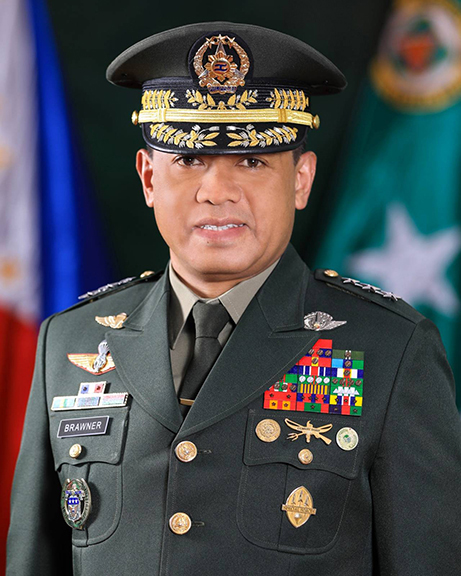
THE military supports the proposal of Defense Secretary Gilberto Teodoro Jr. for the Armed Forces of the Philippines (AFP) to dispose of its real properties as well as assets left from its Retirement and Separation Benefits System (RSBS) worth about P44 billion, and use the proceeds as seed capital for a new and separate pension fund for soldiers, newly confirmed AFP chief Lt. Gen. Romeo Brawner Jr. has told the Commission on Appointments (CA), according to a senior lawmaker.
At Brawner’s recent confirmation hearing, CA Majority Leader LRay Villafuerte said Brawner supported the defense secretary’s position on the sale of AFP assets and the establishment of a pension system for soldiers separate from those of other uniformed personnel.
“I share the same sentiment, especially on the separation of the military from the other uniformed services when it comes to the pension system. We are going to use the existing assets of the AFP to be able to fund the pension that will be needed by our retirees and by our personnel, Mr. Chair,” said Brawner, when asked by Villafuerte whether he shares Teodoro’s position on the substitute Military and Uniformed Personnel (MUP) pension reform bill passed last month by a House ad hoc committee.
Villafuerte, echoing Brawner’s report, said that based on the military leadership’s consultations with stakeholders, soldiers are willing to contribute their share to the new fund to keep the proposed AFP pension system a sustainable one, but they agree with Teodoro that their personal contribution should be at an amount that would—in the defense secretary’s words—affect those in active service in “the least possible way.”
The House ad hoc committee on the MUP, chaired by Albay Rep. Joey Salceda, last month passed a substitute bill on pension reform deemed acceptable to all stakeholders, including Teodoro, who had opposed the measure’s original version.
Villafuerte said at the CA hearing that the financial pickle in the current system is that the retirement pensions and benefits of our MUP are “fully funded by the national government through the annual appropriations despite having no contributions from the retirees.”
Brawner replied, partly in Filipino, that “the AFP has always been willing to sacrifice for our country, and when this news came out about the possible financial collapse of our country because of the pension system, when the soldiers talked about this matter, and when we did our consultations, our soldiers signalled readiness to sacrifice once more.”
He added: “In fact, as I mentioned earlier, when I came into the service, we were already contributing to the RSBS for our pension. Unfortunately, the RSBS had to be closed down because probably of mismanagement, but our soldiers are ready.”
“During our consultations, as much as possible, the personal contribution of our soldiers would not be too big. That is why Secretary Teodoro came up with a scheme in order for us to be able to generate funds for our pension so that we will no longer rely on our GAA (General Appropriations Act or national budget),” Brawner said.
Brawner said this means that even those in the AFP “are also thinking of ways on how to help our country deal with this.”
Villafuerte then assured Brawner that he, along with members of Congress, “share the same sentiment. AFP members should be focusing on their jobs and their families, and when you retire, you should be fully compensated.”
“However, we really have to find ways to solve this, and rest assured that we are finding ways to do so in recognition of all your sacrifices for our country,” Villafuerte added.
The President’s economic team, led by Finance Secretary Benjamin Diokno, found the pension system in its current form unsustainable, as the total unfunded liabilities or future obligations for existing active MUP members and pensioners were estimated at P14 trillion, and such accumulating liabilities are seen to raise the country’s public debt by 25 percent by the year 2030.
Diokno has maintained that the proposed reforms in the MUP pension bill should address the substantial budgetary implications stemming from indexation and the absence of the soldiers’ personnel contributions to the pension fund.
He explained that allowing indexation to continue will be unsustainable and, coupled with guaranteed benefit increases, will further bloat the budget deficit.
Despite potential opposition from the economic managers, Ad Hoc Committee on the MUP Pension System Chairperson Joey Sarte Salceda said the chamber will accept the proposals of Teodoro on the substitute bill to the Military and Uniformed Personnel Pension Reform.
“Of course, the proposal will add some P1.2 trillion more to the actuarial reserve deficiency from the current P2.2 trillion under the current substitute bill,” he said.
Under the DND proposal, Salceda said only new entrants will contribute 9 percent, with the government counterpart contributing 12 percent.
“And I will heed the request for full indexation for those who are retired and due for retirement,” Salceda added.
Salceda also said that “there could be some pushback from the DOF and the economic managers on the Teodoro proposal. So, we hope that within the executive, they will sort their position out.”
Under the committee-level proposed scheme, for the first three years of the reformed MUP pension, the government will shoulder 16 percent of the contribution, while the MUP would contribute 5 percent to fulfill the 21 percent total monthly premium for the trust fund.
In the next three years, 7 percent will come from personnel and 14 percent from the government. This sharing scheme will be updated until the seventh year, when a contribution ratio of 9 percent to 12 percent is reached.
The sharing scheme for new entrants will be 9 percent from personnel and 12 percent from the government.
